Taxation Law & Practice: Black Economy, Sharing Economy, and Impact
VerifiedAdded on 2019/10/31
|12
|3509
|168
Report
AI Summary
This report delves into the complexities of the black economy and sharing economy in Australia, analyzing their impact on the country's taxation system. It begins with a definition of the black economy, its detrimental effects on tax revenue, and the challenges in measuring its size, referencing the Australian Bureau of Statistics' estimates. The report then defines the sharing economy, highlighting the role of online platforms like Airbnb and Uber. It examines the tax implications of these business models, particularly how they enable tax evasion due to their foreign bases and the lack of compliance with traditional tax laws. The report contrasts the tax structures of companies operating under sharing economy models with those of traditional businesses, such as AURA, which complies with Australian tax regulations. Finally, it proposes initiatives to reduce the sharing economy's contribution to the black economy, focusing on educating participants on tax obligations and improving the application of tax laws. The report underscores the challenges faced by the Australian Taxation Office (ATO) in addressing tax evasion within the sharing economy and highlights the importance of adapting regulations to the evolving business landscape.

Taxation Law & Practice
Paraphrase This Document
Need a fresh take? Get an instant paraphrase of this document with our AI Paraphraser
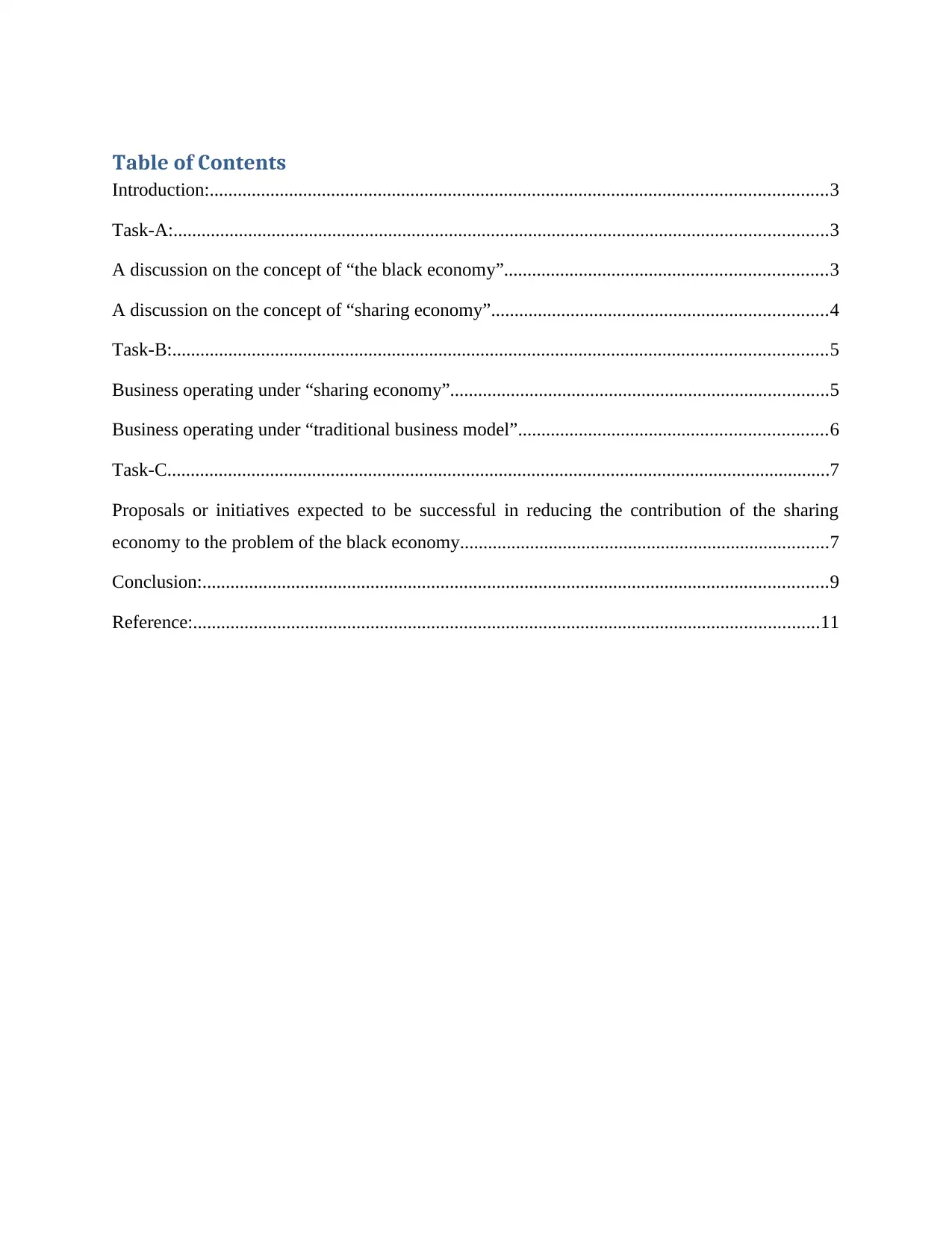
Table of Contents
Introduction:....................................................................................................................................3
Task-A:............................................................................................................................................3
A discussion on the concept of “the black economy”.....................................................................3
A discussion on the concept of “sharing economy”........................................................................4
Task-B:............................................................................................................................................5
Business operating under “sharing economy”.................................................................................5
Business operating under “traditional business model”..................................................................6
Task-C..............................................................................................................................................7
Proposals or initiatives expected to be successful in reducing the contribution of the sharing
economy to the problem of the black economy...............................................................................7
Conclusion:......................................................................................................................................9
Reference:......................................................................................................................................11
Introduction:....................................................................................................................................3
Task-A:............................................................................................................................................3
A discussion on the concept of “the black economy”.....................................................................3
A discussion on the concept of “sharing economy”........................................................................4
Task-B:............................................................................................................................................5
Business operating under “sharing economy”.................................................................................5
Business operating under “traditional business model”..................................................................6
Task-C..............................................................................................................................................7
Proposals or initiatives expected to be successful in reducing the contribution of the sharing
economy to the problem of the black economy...............................................................................7
Conclusion:......................................................................................................................................9
Reference:......................................................................................................................................11
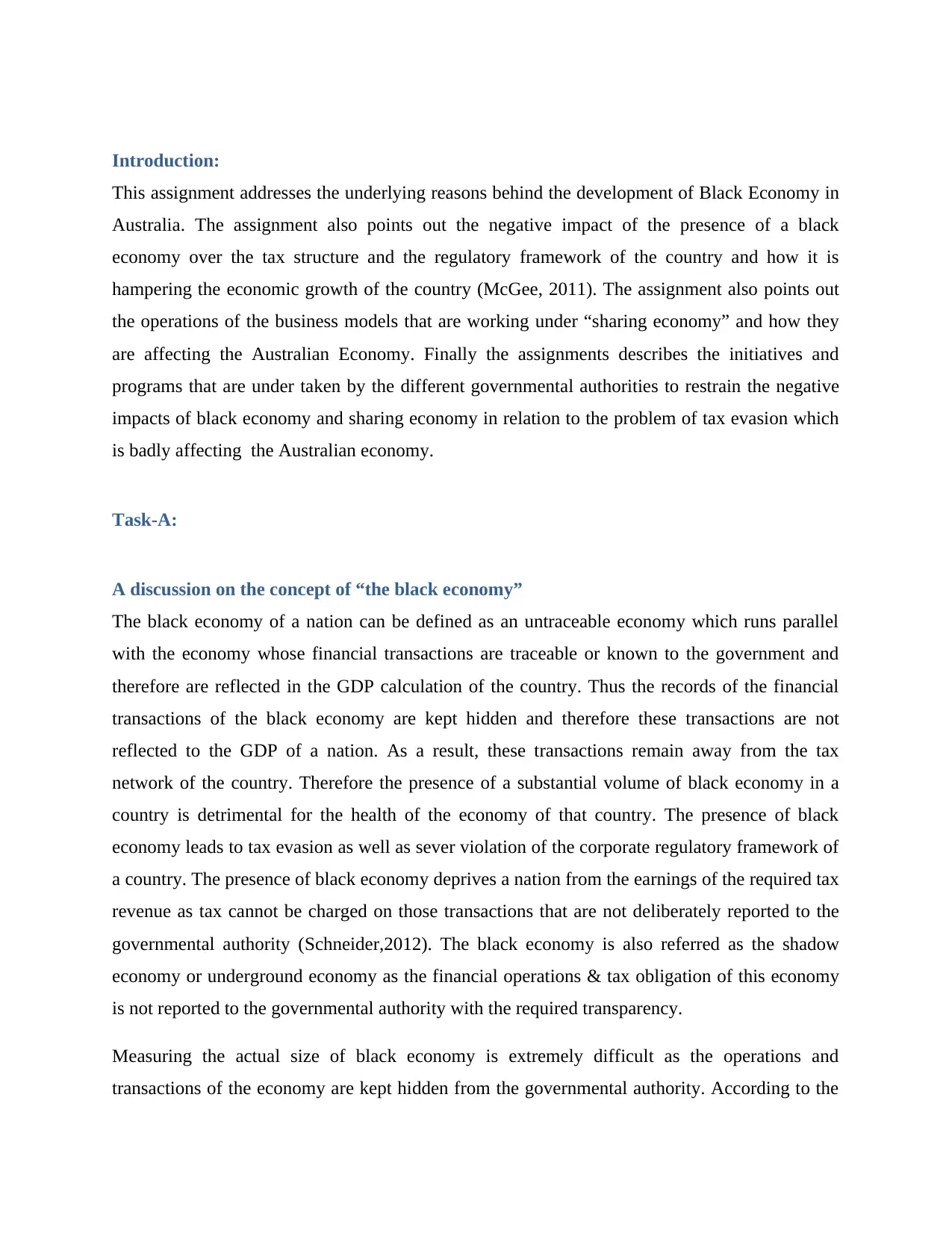
Introduction:
This assignment addresses the underlying reasons behind the development of Black Economy in
Australia. The assignment also points out the negative impact of the presence of a black
economy over the tax structure and the regulatory framework of the country and how it is
hampering the economic growth of the country (McGee, 2011). The assignment also points out
the operations of the business models that are working under “sharing economy” and how they
are affecting the Australian Economy. Finally the assignments describes the initiatives and
programs that are under taken by the different governmental authorities to restrain the negative
impacts of black economy and sharing economy in relation to the problem of tax evasion which
is badly affecting the Australian economy.
Task-A:
A discussion on the concept of “the black economy”
The black economy of a nation can be defined as an untraceable economy which runs parallel
with the economy whose financial transactions are traceable or known to the government and
therefore are reflected in the GDP calculation of the country. Thus the records of the financial
transactions of the black economy are kept hidden and therefore these transactions are not
reflected to the GDP of a nation. As a result, these transactions remain away from the tax
network of the country. Therefore the presence of a substantial volume of black economy in a
country is detrimental for the health of the economy of that country. The presence of black
economy leads to tax evasion as well as sever violation of the corporate regulatory framework of
a country. The presence of black economy deprives a nation from the earnings of the required tax
revenue as tax cannot be charged on those transactions that are not deliberately reported to the
governmental authority (Schneider,2012). The black economy is also referred as the shadow
economy or underground economy as the financial operations & tax obligation of this economy
is not reported to the governmental authority with the required transparency.
Measuring the actual size of black economy is extremely difficult as the operations and
transactions of the economy are kept hidden from the governmental authority. According to the
This assignment addresses the underlying reasons behind the development of Black Economy in
Australia. The assignment also points out the negative impact of the presence of a black
economy over the tax structure and the regulatory framework of the country and how it is
hampering the economic growth of the country (McGee, 2011). The assignment also points out
the operations of the business models that are working under “sharing economy” and how they
are affecting the Australian Economy. Finally the assignments describes the initiatives and
programs that are under taken by the different governmental authorities to restrain the negative
impacts of black economy and sharing economy in relation to the problem of tax evasion which
is badly affecting the Australian economy.
Task-A:
A discussion on the concept of “the black economy”
The black economy of a nation can be defined as an untraceable economy which runs parallel
with the economy whose financial transactions are traceable or known to the government and
therefore are reflected in the GDP calculation of the country. Thus the records of the financial
transactions of the black economy are kept hidden and therefore these transactions are not
reflected to the GDP of a nation. As a result, these transactions remain away from the tax
network of the country. Therefore the presence of a substantial volume of black economy in a
country is detrimental for the health of the economy of that country. The presence of black
economy leads to tax evasion as well as sever violation of the corporate regulatory framework of
a country. The presence of black economy deprives a nation from the earnings of the required tax
revenue as tax cannot be charged on those transactions that are not deliberately reported to the
governmental authority (Schneider,2012). The black economy is also referred as the shadow
economy or underground economy as the financial operations & tax obligation of this economy
is not reported to the governmental authority with the required transparency.
Measuring the actual size of black economy is extremely difficult as the operations and
transactions of the economy are kept hidden from the governmental authority. According to the
⊘ This is a preview!⊘
Do you want full access?
Subscribe today to unlock all pages.

Trusted by 1+ million students worldwide
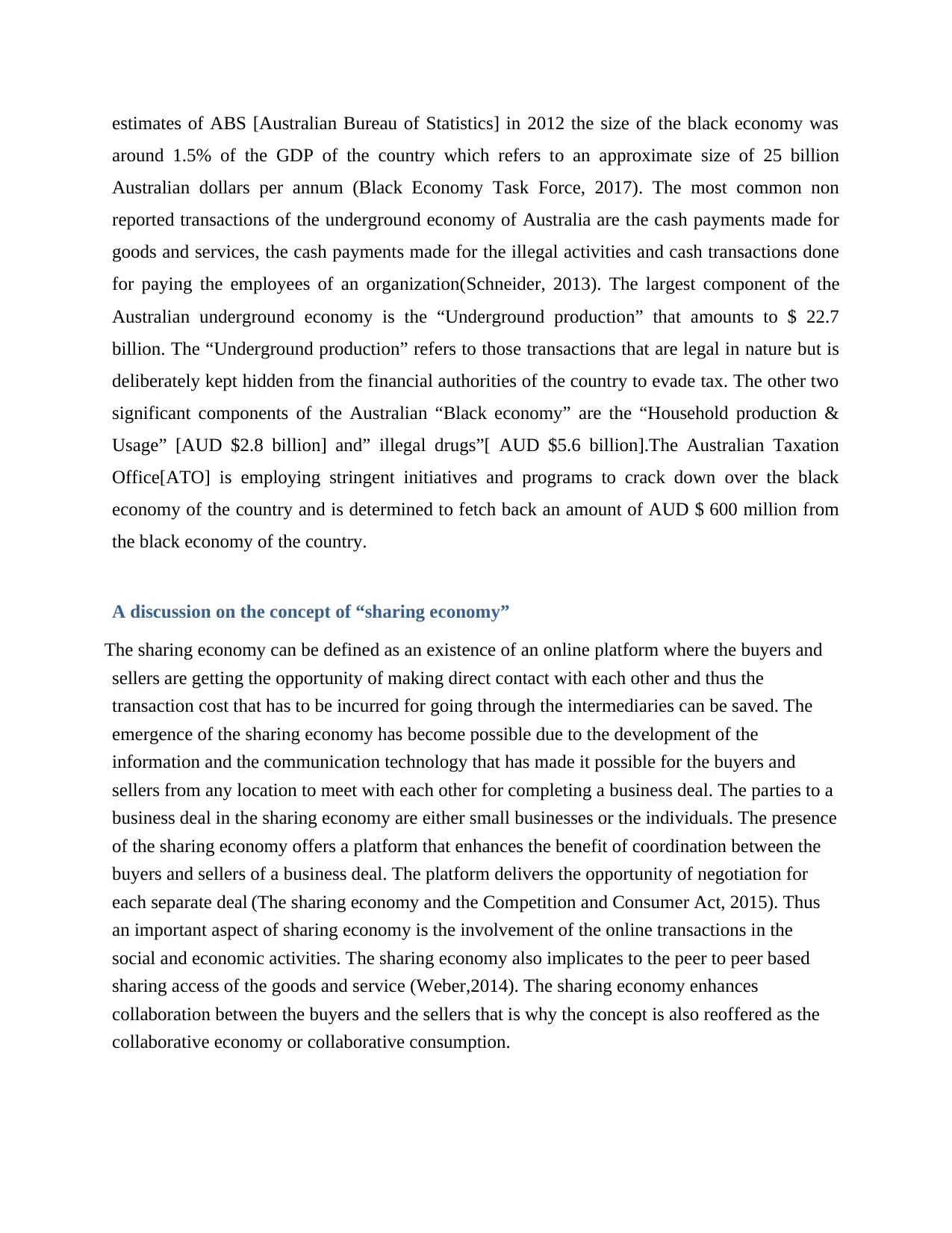
estimates of ABS [Australian Bureau of Statistics] in 2012 the size of the black economy was
around 1.5% of the GDP of the country which refers to an approximate size of 25 billion
Australian dollars per annum (Black Economy Task Force, 2017). The most common non
reported transactions of the underground economy of Australia are the cash payments made for
goods and services, the cash payments made for the illegal activities and cash transactions done
for paying the employees of an organization(Schneider, 2013). The largest component of the
Australian underground economy is the “Underground production” that amounts to $ 22.7
billion. The “Underground production” refers to those transactions that are legal in nature but is
deliberately kept hidden from the financial authorities of the country to evade tax. The other two
significant components of the Australian “Black economy” are the “Household production &
Usage” [AUD $2.8 billion] and” illegal drugs”[ AUD $5.6 billion].The Australian Taxation
Office[ATO] is employing stringent initiatives and programs to crack down over the black
economy of the country and is determined to fetch back an amount of AUD $ 600 million from
the black economy of the country.
A discussion on the concept of “sharing economy”
The sharing economy can be defined as an existence of an online platform where the buyers and
sellers are getting the opportunity of making direct contact with each other and thus the
transaction cost that has to be incurred for going through the intermediaries can be saved. The
emergence of the sharing economy has become possible due to the development of the
information and the communication technology that has made it possible for the buyers and
sellers from any location to meet with each other for completing a business deal. The parties to a
business deal in the sharing economy are either small businesses or the individuals. The presence
of the sharing economy offers a platform that enhances the benefit of coordination between the
buyers and sellers of a business deal. The platform delivers the opportunity of negotiation for
each separate deal (The sharing economy and the Competition and Consumer Act, 2015). Thus
an important aspect of sharing economy is the involvement of the online transactions in the
social and economic activities. The sharing economy also implicates to the peer to peer based
sharing access of the goods and service (Weber,2014). The sharing economy enhances
collaboration between the buyers and the sellers that is why the concept is also reoffered as the
collaborative economy or collaborative consumption.
around 1.5% of the GDP of the country which refers to an approximate size of 25 billion
Australian dollars per annum (Black Economy Task Force, 2017). The most common non
reported transactions of the underground economy of Australia are the cash payments made for
goods and services, the cash payments made for the illegal activities and cash transactions done
for paying the employees of an organization(Schneider, 2013). The largest component of the
Australian underground economy is the “Underground production” that amounts to $ 22.7
billion. The “Underground production” refers to those transactions that are legal in nature but is
deliberately kept hidden from the financial authorities of the country to evade tax. The other two
significant components of the Australian “Black economy” are the “Household production &
Usage” [AUD $2.8 billion] and” illegal drugs”[ AUD $5.6 billion].The Australian Taxation
Office[ATO] is employing stringent initiatives and programs to crack down over the black
economy of the country and is determined to fetch back an amount of AUD $ 600 million from
the black economy of the country.
A discussion on the concept of “sharing economy”
The sharing economy can be defined as an existence of an online platform where the buyers and
sellers are getting the opportunity of making direct contact with each other and thus the
transaction cost that has to be incurred for going through the intermediaries can be saved. The
emergence of the sharing economy has become possible due to the development of the
information and the communication technology that has made it possible for the buyers and
sellers from any location to meet with each other for completing a business deal. The parties to a
business deal in the sharing economy are either small businesses or the individuals. The presence
of the sharing economy offers a platform that enhances the benefit of coordination between the
buyers and sellers of a business deal. The platform delivers the opportunity of negotiation for
each separate deal (The sharing economy and the Competition and Consumer Act, 2015). Thus
an important aspect of sharing economy is the involvement of the online transactions in the
social and economic activities. The sharing economy also implicates to the peer to peer based
sharing access of the goods and service (Weber,2014). The sharing economy enhances
collaboration between the buyers and the sellers that is why the concept is also reoffered as the
collaborative economy or collaborative consumption.
Paraphrase This Document
Need a fresh take? Get an instant paraphrase of this document with our AI Paraphraser
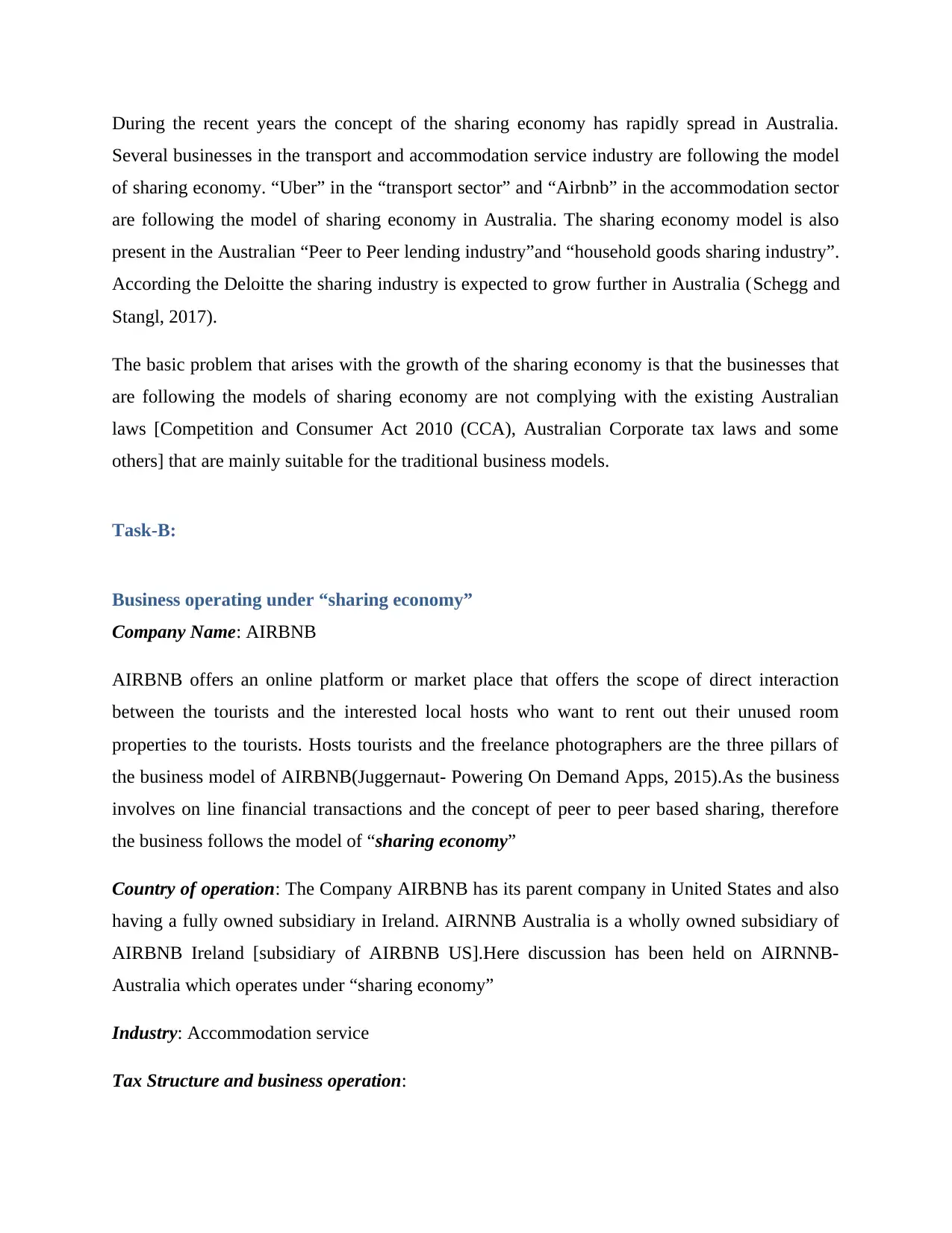
During the recent years the concept of the sharing economy has rapidly spread in Australia.
Several businesses in the transport and accommodation service industry are following the model
of sharing economy. “Uber” in the “transport sector” and “Airbnb” in the accommodation sector
are following the model of sharing economy in Australia. The sharing economy model is also
present in the Australian “Peer to Peer lending industry”and “household goods sharing industry”.
According the Deloitte the sharing industry is expected to grow further in Australia (Schegg and
Stangl, 2017).
The basic problem that arises with the growth of the sharing economy is that the businesses that
are following the models of sharing economy are not complying with the existing Australian
laws [Competition and Consumer Act 2010 (CCA), Australian Corporate tax laws and some
others] that are mainly suitable for the traditional business models.
Task-B:
Business operating under “sharing economy”
Company Name: AIRBNB
AIRBNB offers an online platform or market place that offers the scope of direct interaction
between the tourists and the interested local hosts who want to rent out their unused room
properties to the tourists. Hosts tourists and the freelance photographers are the three pillars of
the business model of AIRBNB(Juggernaut- Powering On Demand Apps, 2015).As the business
involves on line financial transactions and the concept of peer to peer based sharing, therefore
the business follows the model of “sharing economy”
Country of operation: The Company AIRBNB has its parent company in United States and also
having a fully owned subsidiary in Ireland. AIRNNB Australia is a wholly owned subsidiary of
AIRBNB Ireland [subsidiary of AIRBNB US].Here discussion has been held on AIRNNB-
Australia which operates under “sharing economy”
Industry: Accommodation service
Tax Structure and business operation:
Several businesses in the transport and accommodation service industry are following the model
of sharing economy. “Uber” in the “transport sector” and “Airbnb” in the accommodation sector
are following the model of sharing economy in Australia. The sharing economy model is also
present in the Australian “Peer to Peer lending industry”and “household goods sharing industry”.
According the Deloitte the sharing industry is expected to grow further in Australia (Schegg and
Stangl, 2017).
The basic problem that arises with the growth of the sharing economy is that the businesses that
are following the models of sharing economy are not complying with the existing Australian
laws [Competition and Consumer Act 2010 (CCA), Australian Corporate tax laws and some
others] that are mainly suitable for the traditional business models.
Task-B:
Business operating under “sharing economy”
Company Name: AIRBNB
AIRBNB offers an online platform or market place that offers the scope of direct interaction
between the tourists and the interested local hosts who want to rent out their unused room
properties to the tourists. Hosts tourists and the freelance photographers are the three pillars of
the business model of AIRBNB(Juggernaut- Powering On Demand Apps, 2015).As the business
involves on line financial transactions and the concept of peer to peer based sharing, therefore
the business follows the model of “sharing economy”
Country of operation: The Company AIRBNB has its parent company in United States and also
having a fully owned subsidiary in Ireland. AIRNNB Australia is a wholly owned subsidiary of
AIRBNB Ireland [subsidiary of AIRBNB US].Here discussion has been held on AIRNNB-
Australia which operates under “sharing economy”
Industry: Accommodation service
Tax Structure and business operation:
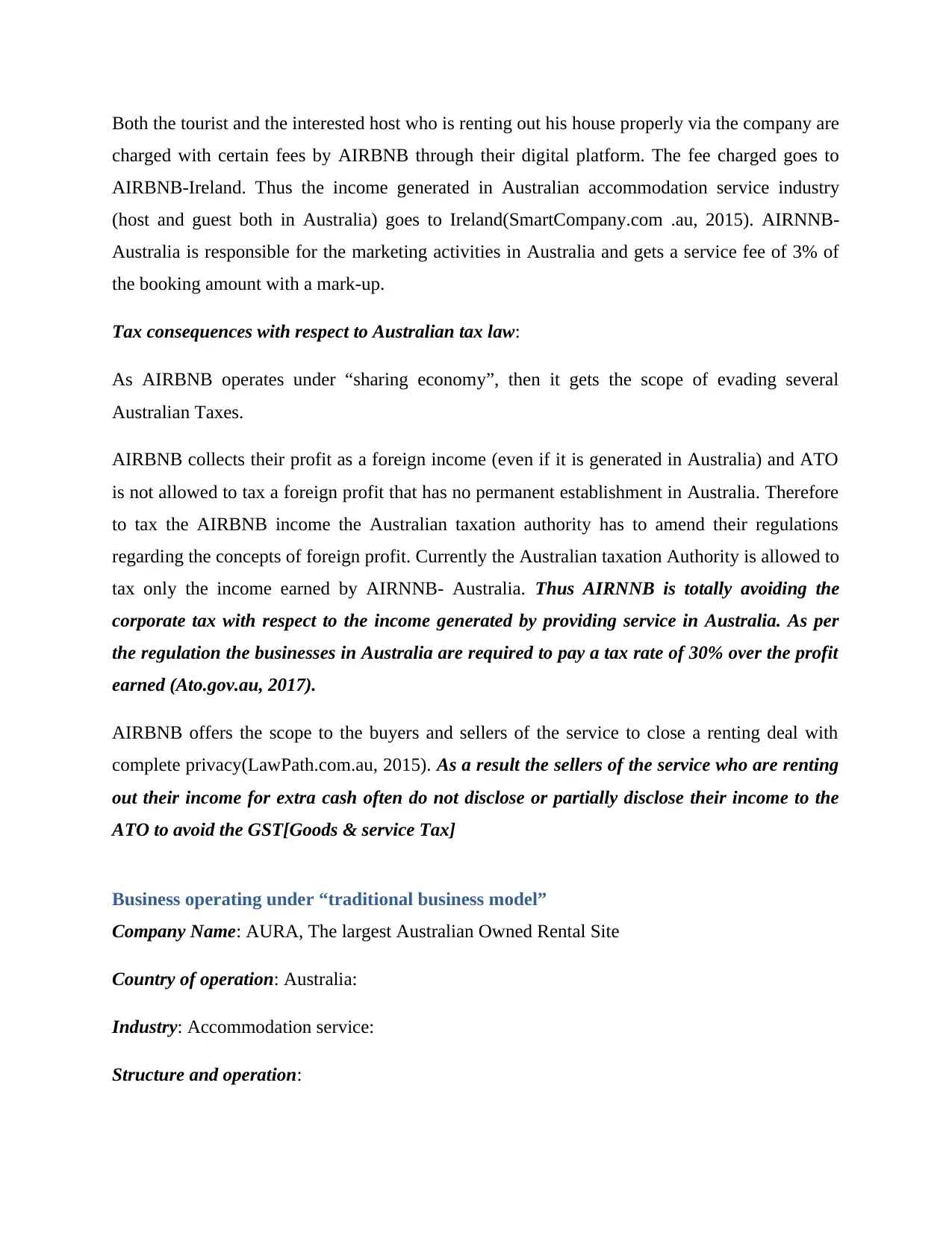
Both the tourist and the interested host who is renting out his house properly via the company are
charged with certain fees by AIRBNB through their digital platform. The fee charged goes to
AIRBNB-Ireland. Thus the income generated in Australian accommodation service industry
(host and guest both in Australia) goes to Ireland(SmartCompany.com .au, 2015). AIRNNB-
Australia is responsible for the marketing activities in Australia and gets a service fee of 3% of
the booking amount with a mark-up.
Tax consequences with respect to Australian tax law:
As AIRBNB operates under “sharing economy”, then it gets the scope of evading several
Australian Taxes.
AIRBNB collects their profit as a foreign income (even if it is generated in Australia) and ATO
is not allowed to tax a foreign profit that has no permanent establishment in Australia. Therefore
to tax the AIRBNB income the Australian taxation authority has to amend their regulations
regarding the concepts of foreign profit. Currently the Australian taxation Authority is allowed to
tax only the income earned by AIRNNB- Australia. Thus AIRNNB is totally avoiding the
corporate tax with respect to the income generated by providing service in Australia. As per
the regulation the businesses in Australia are required to pay a tax rate of 30% over the profit
earned (Ato.gov.au, 2017).
AIRBNB offers the scope to the buyers and sellers of the service to close a renting deal with
complete privacy(LawPath.com.au, 2015). As a result the sellers of the service who are renting
out their income for extra cash often do not disclose or partially disclose their income to the
ATO to avoid the GST[Goods & service Tax]
Business operating under “traditional business model”
Company Name: AURA, The largest Australian Owned Rental Site
Country of operation: Australia:
Industry: Accommodation service:
Structure and operation:
charged with certain fees by AIRBNB through their digital platform. The fee charged goes to
AIRBNB-Ireland. Thus the income generated in Australian accommodation service industry
(host and guest both in Australia) goes to Ireland(SmartCompany.com .au, 2015). AIRNNB-
Australia is responsible for the marketing activities in Australia and gets a service fee of 3% of
the booking amount with a mark-up.
Tax consequences with respect to Australian tax law:
As AIRBNB operates under “sharing economy”, then it gets the scope of evading several
Australian Taxes.
AIRBNB collects their profit as a foreign income (even if it is generated in Australia) and ATO
is not allowed to tax a foreign profit that has no permanent establishment in Australia. Therefore
to tax the AIRBNB income the Australian taxation authority has to amend their regulations
regarding the concepts of foreign profit. Currently the Australian taxation Authority is allowed to
tax only the income earned by AIRNNB- Australia. Thus AIRNNB is totally avoiding the
corporate tax with respect to the income generated by providing service in Australia. As per
the regulation the businesses in Australia are required to pay a tax rate of 30% over the profit
earned (Ato.gov.au, 2017).
AIRBNB offers the scope to the buyers and sellers of the service to close a renting deal with
complete privacy(LawPath.com.au, 2015). As a result the sellers of the service who are renting
out their income for extra cash often do not disclose or partially disclose their income to the
ATO to avoid the GST[Goods & service Tax]
Business operating under “traditional business model”
Company Name: AURA, The largest Australian Owned Rental Site
Country of operation: Australia:
Industry: Accommodation service:
Structure and operation:
⊘ This is a preview!⊘
Do you want full access?
Subscribe today to unlock all pages.

Trusted by 1+ million students worldwide
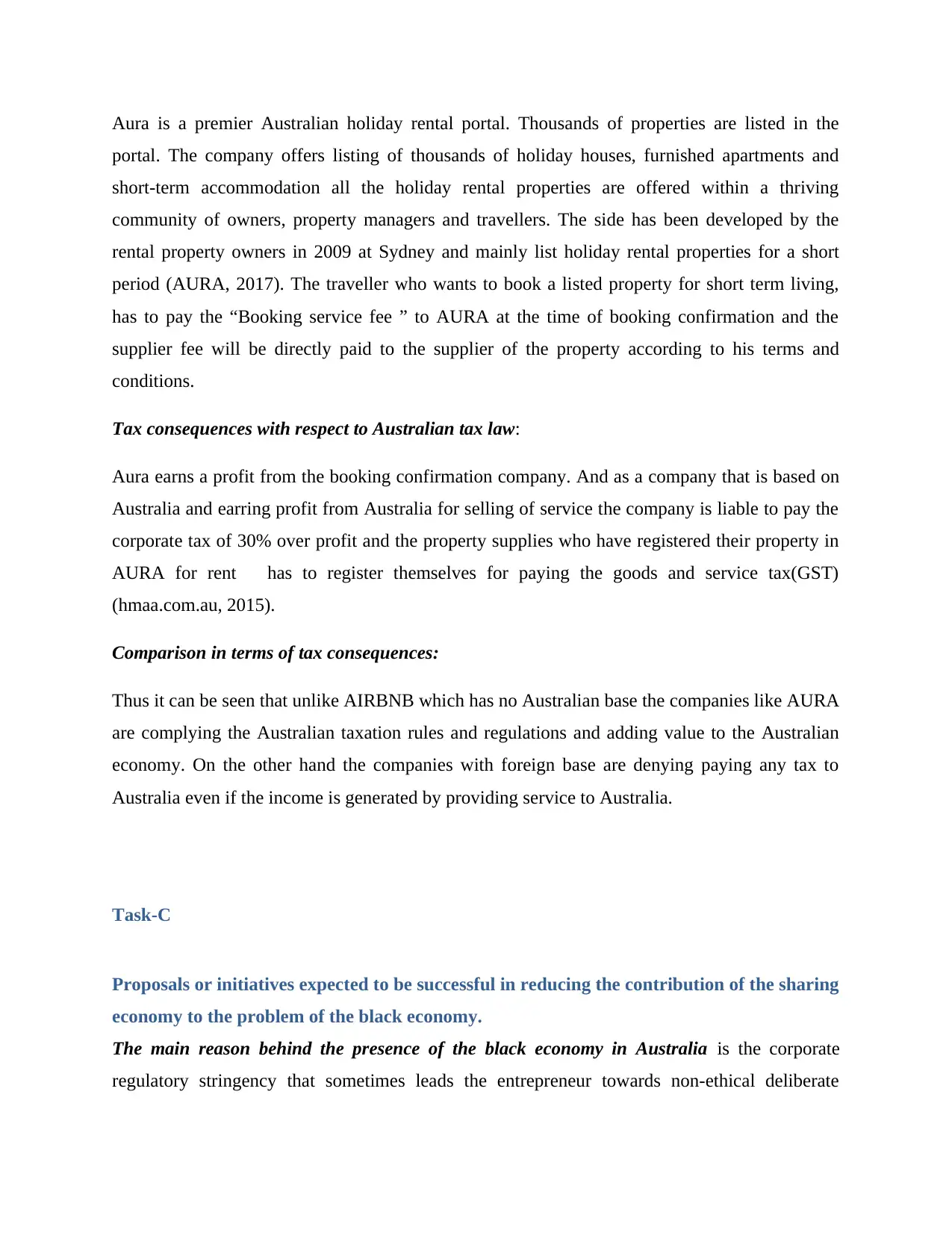
Aura is a premier Australian holiday rental portal. Thousands of properties are listed in the
portal. The company offers listing of thousands of holiday houses, furnished apartments and
short-term accommodation all the holiday rental properties are offered within a thriving
community of owners, property managers and travellers. The side has been developed by the
rental property owners in 2009 at Sydney and mainly list holiday rental properties for a short
period (AURA, 2017). The traveller who wants to book a listed property for short term living,
has to pay the “Booking service fee ” to AURA at the time of booking confirmation and the
supplier fee will be directly paid to the supplier of the property according to his terms and
conditions.
Tax consequences with respect to Australian tax law:
Aura earns a profit from the booking confirmation company. And as a company that is based on
Australia and earring profit from Australia for selling of service the company is liable to pay the
corporate tax of 30% over profit and the property supplies who have registered their property in
AURA for rent has to register themselves for paying the goods and service tax(GST)
(hmaa.com.au, 2015).
Comparison in terms of tax consequences:
Thus it can be seen that unlike AIRBNB which has no Australian base the companies like AURA
are complying the Australian taxation rules and regulations and adding value to the Australian
economy. On the other hand the companies with foreign base are denying paying any tax to
Australia even if the income is generated by providing service to Australia.
Task-C
Proposals or initiatives expected to be successful in reducing the contribution of the sharing
economy to the problem of the black economy.
The main reason behind the presence of the black economy in Australia is the corporate
regulatory stringency that sometimes leads the entrepreneur towards non-ethical deliberate
portal. The company offers listing of thousands of holiday houses, furnished apartments and
short-term accommodation all the holiday rental properties are offered within a thriving
community of owners, property managers and travellers. The side has been developed by the
rental property owners in 2009 at Sydney and mainly list holiday rental properties for a short
period (AURA, 2017). The traveller who wants to book a listed property for short term living,
has to pay the “Booking service fee ” to AURA at the time of booking confirmation and the
supplier fee will be directly paid to the supplier of the property according to his terms and
conditions.
Tax consequences with respect to Australian tax law:
Aura earns a profit from the booking confirmation company. And as a company that is based on
Australia and earring profit from Australia for selling of service the company is liable to pay the
corporate tax of 30% over profit and the property supplies who have registered their property in
AURA for rent has to register themselves for paying the goods and service tax(GST)
(hmaa.com.au, 2015).
Comparison in terms of tax consequences:
Thus it can be seen that unlike AIRBNB which has no Australian base the companies like AURA
are complying the Australian taxation rules and regulations and adding value to the Australian
economy. On the other hand the companies with foreign base are denying paying any tax to
Australia even if the income is generated by providing service to Australia.
Task-C
Proposals or initiatives expected to be successful in reducing the contribution of the sharing
economy to the problem of the black economy.
The main reason behind the presence of the black economy in Australia is the corporate
regulatory stringency that sometimes leads the entrepreneur towards non-ethical deliberate
Paraphrase This Document
Need a fresh take? Get an instant paraphrase of this document with our AI Paraphraser
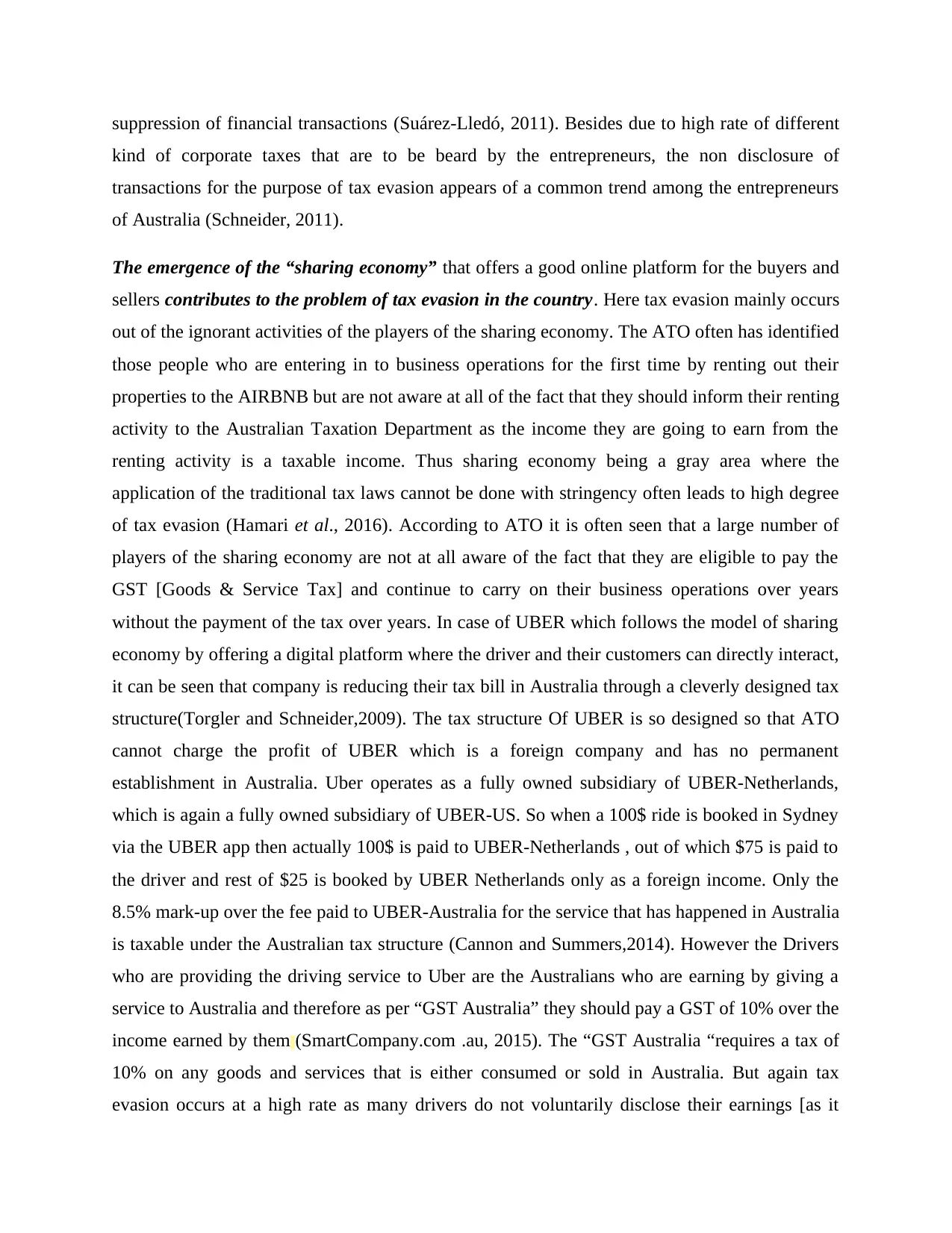
suppression of financial transactions (Suárez-Lledó, 2011). Besides due to high rate of different
kind of corporate taxes that are to be beard by the entrepreneurs, the non disclosure of
transactions for the purpose of tax evasion appears of a common trend among the entrepreneurs
of Australia (Schneider, 2011).
The emergence of the “sharing economy” that offers a good online platform for the buyers and
sellers contributes to the problem of tax evasion in the country. Here tax evasion mainly occurs
out of the ignorant activities of the players of the sharing economy. The ATO often has identified
those people who are entering in to business operations for the first time by renting out their
properties to the AIRBNB but are not aware at all of the fact that they should inform their renting
activity to the Australian Taxation Department as the income they are going to earn from the
renting activity is a taxable income. Thus sharing economy being a gray area where the
application of the traditional tax laws cannot be done with stringency often leads to high degree
of tax evasion (Hamari et al., 2016). According to ATO it is often seen that a large number of
players of the sharing economy are not at all aware of the fact that they are eligible to pay the
GST [Goods & Service Tax] and continue to carry on their business operations over years
without the payment of the tax over years. In case of UBER which follows the model of sharing
economy by offering a digital platform where the driver and their customers can directly interact,
it can be seen that company is reducing their tax bill in Australia through a cleverly designed tax
structure(Torgler and Schneider,2009). The tax structure Of UBER is so designed so that ATO
cannot charge the profit of UBER which is a foreign company and has no permanent
establishment in Australia. Uber operates as a fully owned subsidiary of UBER-Netherlands,
which is again a fully owned subsidiary of UBER-US. So when a 100$ ride is booked in Sydney
via the UBER app then actually 100$ is paid to UBER-Netherlands , out of which $75 is paid to
the driver and rest of $25 is booked by UBER Netherlands only as a foreign income. Only the
8.5% mark-up over the fee paid to UBER-Australia for the service that has happened in Australia
is taxable under the Australian tax structure (Cannon and Summers,2014). However the Drivers
who are providing the driving service to Uber are the Australians who are earning by giving a
service to Australia and therefore as per “GST Australia” they should pay a GST of 10% over the
income earned by them (SmartCompany.com .au, 2015). The “GST Australia “requires a tax of
10% on any goods and services that is either consumed or sold in Australia. But again tax
evasion occurs at a high rate as many drivers do not voluntarily disclose their earnings [as it
kind of corporate taxes that are to be beard by the entrepreneurs, the non disclosure of
transactions for the purpose of tax evasion appears of a common trend among the entrepreneurs
of Australia (Schneider, 2011).
The emergence of the “sharing economy” that offers a good online platform for the buyers and
sellers contributes to the problem of tax evasion in the country. Here tax evasion mainly occurs
out of the ignorant activities of the players of the sharing economy. The ATO often has identified
those people who are entering in to business operations for the first time by renting out their
properties to the AIRBNB but are not aware at all of the fact that they should inform their renting
activity to the Australian Taxation Department as the income they are going to earn from the
renting activity is a taxable income. Thus sharing economy being a gray area where the
application of the traditional tax laws cannot be done with stringency often leads to high degree
of tax evasion (Hamari et al., 2016). According to ATO it is often seen that a large number of
players of the sharing economy are not at all aware of the fact that they are eligible to pay the
GST [Goods & Service Tax] and continue to carry on their business operations over years
without the payment of the tax over years. In case of UBER which follows the model of sharing
economy by offering a digital platform where the driver and their customers can directly interact,
it can be seen that company is reducing their tax bill in Australia through a cleverly designed tax
structure(Torgler and Schneider,2009). The tax structure Of UBER is so designed so that ATO
cannot charge the profit of UBER which is a foreign company and has no permanent
establishment in Australia. Uber operates as a fully owned subsidiary of UBER-Netherlands,
which is again a fully owned subsidiary of UBER-US. So when a 100$ ride is booked in Sydney
via the UBER app then actually 100$ is paid to UBER-Netherlands , out of which $75 is paid to
the driver and rest of $25 is booked by UBER Netherlands only as a foreign income. Only the
8.5% mark-up over the fee paid to UBER-Australia for the service that has happened in Australia
is taxable under the Australian tax structure (Cannon and Summers,2014). However the Drivers
who are providing the driving service to Uber are the Australians who are earning by giving a
service to Australia and therefore as per “GST Australia” they should pay a GST of 10% over the
income earned by them (SmartCompany.com .au, 2015). The “GST Australia “requires a tax of
10% on any goods and services that is either consumed or sold in Australia. But again tax
evasion occurs at a high rate as many drivers do not voluntarily disclose their earnings [as it
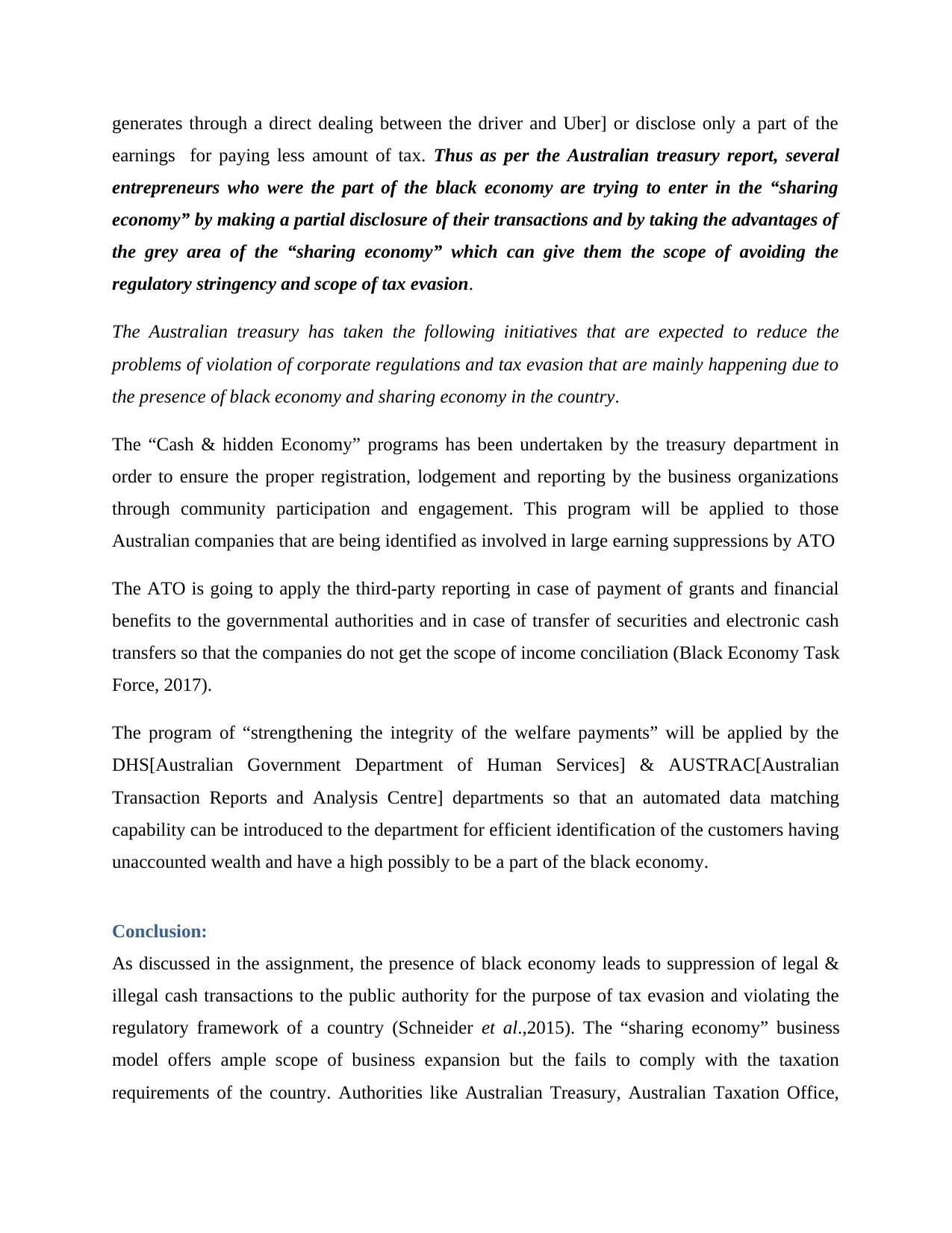
generates through a direct dealing between the driver and Uber] or disclose only a part of the
earnings for paying less amount of tax. Thus as per the Australian treasury report, several
entrepreneurs who were the part of the black economy are trying to enter in the “sharing
economy” by making a partial disclosure of their transactions and by taking the advantages of
the grey area of the “sharing economy” which can give them the scope of avoiding the
regulatory stringency and scope of tax evasion.
The Australian treasury has taken the following initiatives that are expected to reduce the
problems of violation of corporate regulations and tax evasion that are mainly happening due to
the presence of black economy and sharing economy in the country.
The “Cash & hidden Economy” programs has been undertaken by the treasury department in
order to ensure the proper registration, lodgement and reporting by the business organizations
through community participation and engagement. This program will be applied to those
Australian companies that are being identified as involved in large earning suppressions by ATO
The ATO is going to apply the third-party reporting in case of payment of grants and financial
benefits to the governmental authorities and in case of transfer of securities and electronic cash
transfers so that the companies do not get the scope of income conciliation (Black Economy Task
Force, 2017).
The program of “strengthening the integrity of the welfare payments” will be applied by the
DHS[Australian Government Department of Human Services] & AUSTRAC[Australian
Transaction Reports and Analysis Centre] departments so that an automated data matching
capability can be introduced to the department for efficient identification of the customers having
unaccounted wealth and have a high possibly to be a part of the black economy.
Conclusion:
As discussed in the assignment, the presence of black economy leads to suppression of legal &
illegal cash transactions to the public authority for the purpose of tax evasion and violating the
regulatory framework of a country (Schneider et al.,2015). The “sharing economy” business
model offers ample scope of business expansion but the fails to comply with the taxation
requirements of the country. Authorities like Australian Treasury, Australian Taxation Office,
earnings for paying less amount of tax. Thus as per the Australian treasury report, several
entrepreneurs who were the part of the black economy are trying to enter in the “sharing
economy” by making a partial disclosure of their transactions and by taking the advantages of
the grey area of the “sharing economy” which can give them the scope of avoiding the
regulatory stringency and scope of tax evasion.
The Australian treasury has taken the following initiatives that are expected to reduce the
problems of violation of corporate regulations and tax evasion that are mainly happening due to
the presence of black economy and sharing economy in the country.
The “Cash & hidden Economy” programs has been undertaken by the treasury department in
order to ensure the proper registration, lodgement and reporting by the business organizations
through community participation and engagement. This program will be applied to those
Australian companies that are being identified as involved in large earning suppressions by ATO
The ATO is going to apply the third-party reporting in case of payment of grants and financial
benefits to the governmental authorities and in case of transfer of securities and electronic cash
transfers so that the companies do not get the scope of income conciliation (Black Economy Task
Force, 2017).
The program of “strengthening the integrity of the welfare payments” will be applied by the
DHS[Australian Government Department of Human Services] & AUSTRAC[Australian
Transaction Reports and Analysis Centre] departments so that an automated data matching
capability can be introduced to the department for efficient identification of the customers having
unaccounted wealth and have a high possibly to be a part of the black economy.
Conclusion:
As discussed in the assignment, the presence of black economy leads to suppression of legal &
illegal cash transactions to the public authority for the purpose of tax evasion and violating the
regulatory framework of a country (Schneider et al.,2015). The “sharing economy” business
model offers ample scope of business expansion but the fails to comply with the taxation
requirements of the country. Authorities like Australian Treasury, Australian Taxation Office,
⊘ This is a preview!⊘
Do you want full access?
Subscribe today to unlock all pages.

Trusted by 1+ million students worldwide
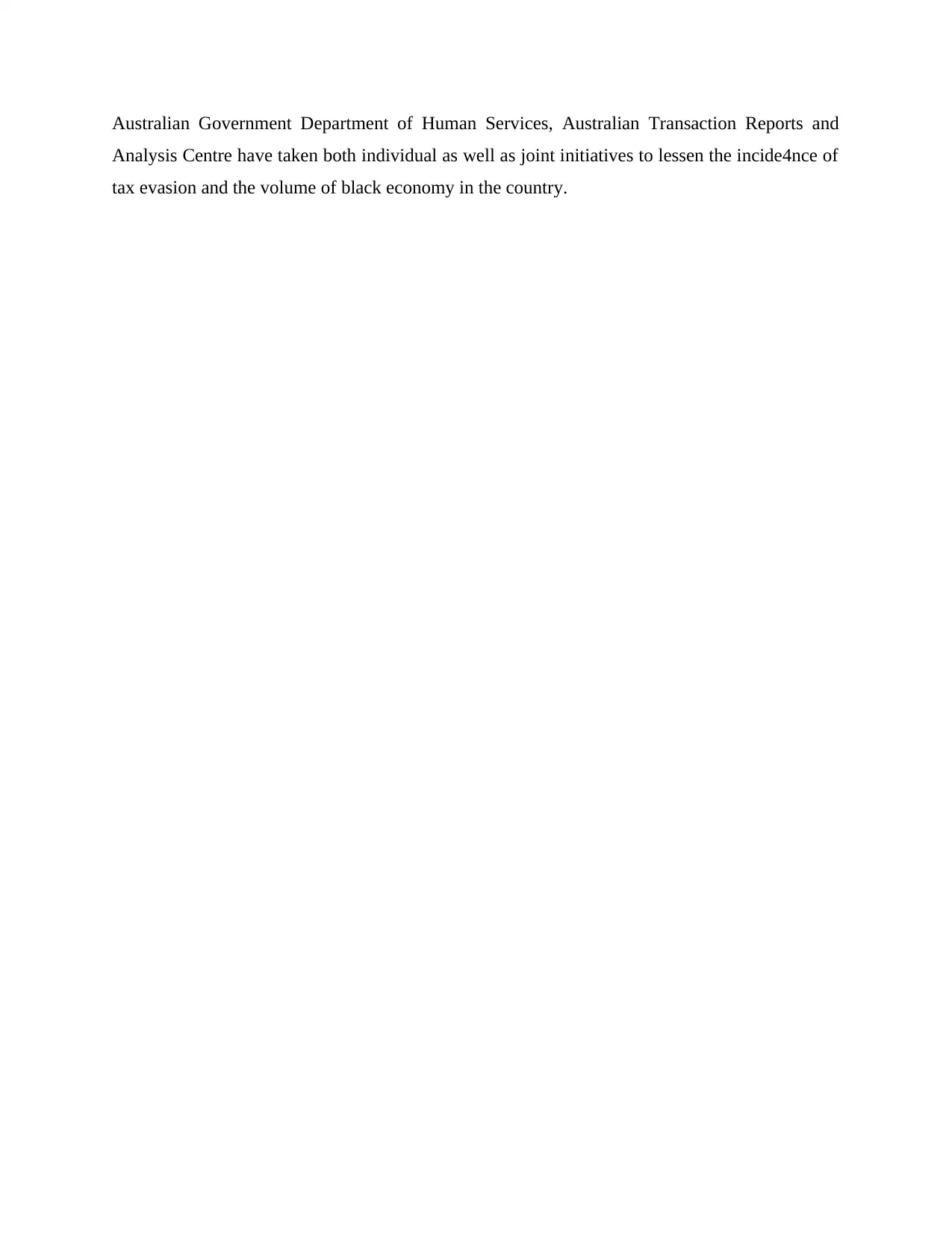
Australian Government Department of Human Services, Australian Transaction Reports and
Analysis Centre have taken both individual as well as joint initiatives to lessen the incide4nce of
tax evasion and the volume of black economy in the country.
Analysis Centre have taken both individual as well as joint initiatives to lessen the incide4nce of
tax evasion and the volume of black economy in the country.
Paraphrase This Document
Need a fresh take? Get an instant paraphrase of this document with our AI Paraphraser
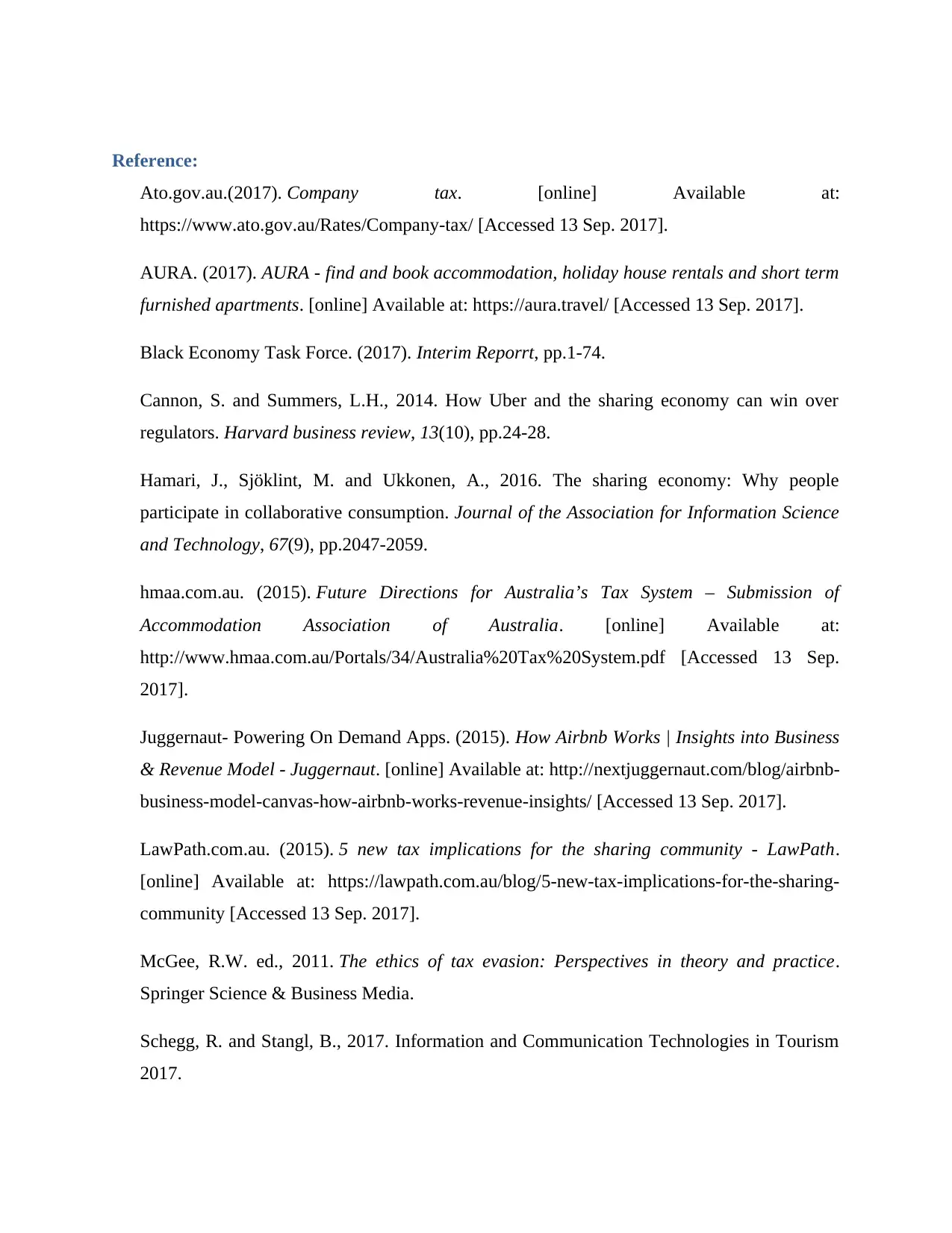
Reference:
Ato.gov.au.(2017). Company tax. [online] Available at:
https://www.ato.gov.au/Rates/Company-tax/ [Accessed 13 Sep. 2017].
AURA. (2017). AURA - find and book accommodation, holiday house rentals and short term
furnished apartments. [online] Available at: https://aura.travel/ [Accessed 13 Sep. 2017].
Black Economy Task Force. (2017). Interim Reporrt, pp.1-74.
Cannon, S. and Summers, L.H., 2014. How Uber and the sharing economy can win over
regulators. Harvard business review, 13(10), pp.24-28.
Hamari, J., Sjöklint, M. and Ukkonen, A., 2016. The sharing economy: Why people
participate in collaborative consumption. Journal of the Association for Information Science
and Technology, 67(9), pp.2047-2059.
hmaa.com.au. (2015). Future Directions for Australia’s Tax System – Submission of
Accommodation Association of Australia. [online] Available at:
http://www.hmaa.com.au/Portals/34/Australia%20Tax%20System.pdf [Accessed 13 Sep.
2017].
Juggernaut- Powering On Demand Apps. (2015). How Airbnb Works | Insights into Business
& Revenue Model - Juggernaut. [online] Available at: http://nextjuggernaut.com/blog/airbnb-
business-model-canvas-how-airbnb-works-revenue-insights/ [Accessed 13 Sep. 2017].
LawPath.com.au. (2015). 5 new tax implications for the sharing community - LawPath.
[online] Available at: https://lawpath.com.au/blog/5-new-tax-implications-for-the-sharing-
community [Accessed 13 Sep. 2017].
McGee, R.W. ed., 2011. The ethics of tax evasion: Perspectives in theory and practice.
Springer Science & Business Media.
Schegg, R. and Stangl, B., 2017. Information and Communication Technologies in Tourism
2017.
Ato.gov.au.(2017). Company tax. [online] Available at:
https://www.ato.gov.au/Rates/Company-tax/ [Accessed 13 Sep. 2017].
AURA. (2017). AURA - find and book accommodation, holiday house rentals and short term
furnished apartments. [online] Available at: https://aura.travel/ [Accessed 13 Sep. 2017].
Black Economy Task Force. (2017). Interim Reporrt, pp.1-74.
Cannon, S. and Summers, L.H., 2014. How Uber and the sharing economy can win over
regulators. Harvard business review, 13(10), pp.24-28.
Hamari, J., Sjöklint, M. and Ukkonen, A., 2016. The sharing economy: Why people
participate in collaborative consumption. Journal of the Association for Information Science
and Technology, 67(9), pp.2047-2059.
hmaa.com.au. (2015). Future Directions for Australia’s Tax System – Submission of
Accommodation Association of Australia. [online] Available at:
http://www.hmaa.com.au/Portals/34/Australia%20Tax%20System.pdf [Accessed 13 Sep.
2017].
Juggernaut- Powering On Demand Apps. (2015). How Airbnb Works | Insights into Business
& Revenue Model - Juggernaut. [online] Available at: http://nextjuggernaut.com/blog/airbnb-
business-model-canvas-how-airbnb-works-revenue-insights/ [Accessed 13 Sep. 2017].
LawPath.com.au. (2015). 5 new tax implications for the sharing community - LawPath.
[online] Available at: https://lawpath.com.au/blog/5-new-tax-implications-for-the-sharing-
community [Accessed 13 Sep. 2017].
McGee, R.W. ed., 2011. The ethics of tax evasion: Perspectives in theory and practice.
Springer Science & Business Media.
Schegg, R. and Stangl, B., 2017. Information and Communication Technologies in Tourism
2017.
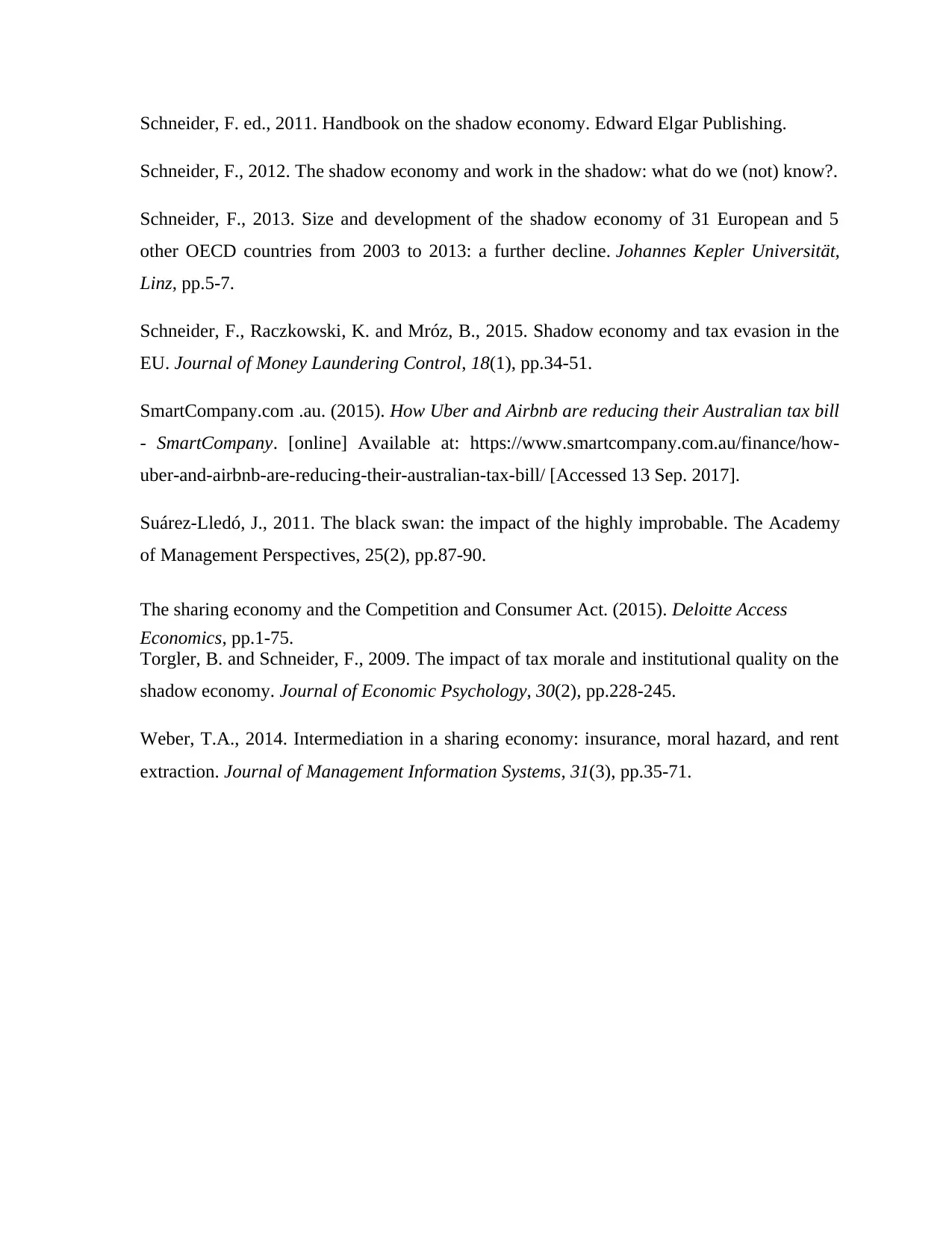
Schneider, F. ed., 2011. Handbook on the shadow economy. Edward Elgar Publishing.
Schneider, F., 2012. The shadow economy and work in the shadow: what do we (not) know?.
Schneider, F., 2013. Size and development of the shadow economy of 31 European and 5
other OECD countries from 2003 to 2013: a further decline. Johannes Kepler Universität,
Linz, pp.5-7.
Schneider, F., Raczkowski, K. and Mróz, B., 2015. Shadow economy and tax evasion in the
EU. Journal of Money Laundering Control, 18(1), pp.34-51.
SmartCompany.com .au. (2015). How Uber and Airbnb are reducing their Australian tax bill
- SmartCompany. [online] Available at: https://www.smartcompany.com.au/finance/how-
uber-and-airbnb-are-reducing-their-australian-tax-bill/ [Accessed 13 Sep. 2017].
Suárez-Lledó, J., 2011. The black swan: the impact of the highly improbable. The Academy
of Management Perspectives, 25(2), pp.87-90.
The sharing economy and the Competition and Consumer Act. (2015). Deloitte Access
Economics, pp.1-75.
Torgler, B. and Schneider, F., 2009. The impact of tax morale and institutional quality on the
shadow economy. Journal of Economic Psychology, 30(2), pp.228-245.
Weber, T.A., 2014. Intermediation in a sharing economy: insurance, moral hazard, and rent
extraction. Journal of Management Information Systems, 31(3), pp.35-71.
Schneider, F., 2012. The shadow economy and work in the shadow: what do we (not) know?.
Schneider, F., 2013. Size and development of the shadow economy of 31 European and 5
other OECD countries from 2003 to 2013: a further decline. Johannes Kepler Universität,
Linz, pp.5-7.
Schneider, F., Raczkowski, K. and Mróz, B., 2015. Shadow economy and tax evasion in the
EU. Journal of Money Laundering Control, 18(1), pp.34-51.
SmartCompany.com .au. (2015). How Uber and Airbnb are reducing their Australian tax bill
- SmartCompany. [online] Available at: https://www.smartcompany.com.au/finance/how-
uber-and-airbnb-are-reducing-their-australian-tax-bill/ [Accessed 13 Sep. 2017].
Suárez-Lledó, J., 2011. The black swan: the impact of the highly improbable. The Academy
of Management Perspectives, 25(2), pp.87-90.
The sharing economy and the Competition and Consumer Act. (2015). Deloitte Access
Economics, pp.1-75.
Torgler, B. and Schneider, F., 2009. The impact of tax morale and institutional quality on the
shadow economy. Journal of Economic Psychology, 30(2), pp.228-245.
Weber, T.A., 2014. Intermediation in a sharing economy: insurance, moral hazard, and rent
extraction. Journal of Management Information Systems, 31(3), pp.35-71.
⊘ This is a preview!⊘
Do you want full access?
Subscribe today to unlock all pages.

Trusted by 1+ million students worldwide
1 out of 12
Related Documents
Your All-in-One AI-Powered Toolkit for Academic Success.
+13062052269
info@desklib.com
Available 24*7 on WhatsApp / Email
![[object Object]](/_next/static/media/star-bottom.7253800d.svg)
Unlock your academic potential
Copyright © 2020–2026 A2Z Services. All Rights Reserved. Developed and managed by ZUCOL.





